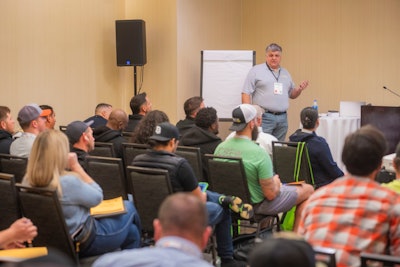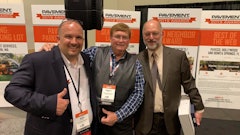
Many times in the pavement maintenance industry, contractors often diversify their services to serve their customers as a one-stop shop. Jim Panzenhagen, a 30+ year striping industry veteran, never wanted that. He knew very early on that he wanted to be a master in his craft and has become a well-known striping industry professional who is highly regarded for his expertise.
Like most starting out in the industry though, it wasn’t always that way,
Panzenhagen was working as a property manager for a local real estate company in the New York Tri State Area in 1993. He purchased a pressure pop striping machine for $500 and started making some money with it on the properties he managed.
“A management company owner asked me if I wanted to purchase one of his striping machines and he said he’d teach me everything he knew about the business,” Panzenhagen said. “I paid $2,000 for one of the original Graco 5000 machines in 1993 and I worked with him for several years and he showed me everything about the business, going back and forth. I then bought my second Titan 6000 and it was just my best friend from growing up and myself going out on the weekends in my van painting parking lots for this guy for a few years.”
Once Panzenhagen knew he wanted to make a career out of this work, he started to dive in head first and his company, JMP Excelsior Services, LLC, began.
“I did a lot of research back in the early 90s, it was just Google back then,” Panzenhagen said. “Then I came across Robert Liles’ Parking Lot Planet which was a wealth of information and where I learned most of what I needed to know. On this old forum, I talked with experts and contractors and I met the greatest bunch of guys from his forum that I still talk to to this day, almost 30 years later.”
Education for Expertise
Beyond the forums, Panzenhagen knew that he needed to get more information if he wanted to succeed. He found industry trade shows invaluable to advancing his business.
“I started going to the seminars and I would take the same seminar year after year because the seminars change,” Panzenhagen said. “I was just looking for the newest, fastest, and I guess, the quickest but most efficient way of doing the work. I always thought that if I could cut an hour off of every job, it's an hour more I have with my family. So that was my big push through learning the industry and how I could get the job done faster at the same quality and make more money doing it.”
While Panzenhagen was growing his business, he relied on his network to help him tackle the big jobs. Many of these people who helped him on those jobs, stayed with him and helped him grow his employee pool - a must for his rapid growth.
“I received an email out of the blue and it asked me if I would work for this guy I had never heard from,” Panzenhagen said. “I didn't know who this guy was, so I responded to it and asked him what he had. It turns out that he had the Walmart contract for New Jersey and Delaware. That was a lucky email.”
At the time, JMP had two other chain driven lazy liners, but still considered their business new with only about 10 years under its belt.
“We weren’t high production in the least and now we're doing almost 80 stores a year, re-striping with three to four people,” Panzenhagen said. “I went from using maybe 1,000 to 1,500 gallons a year to using almost 14,000 gallons of paint a year.”
While the business of course struggled with the 2008 recession, shrinking down to two full time employees, it allowed the company to find ways to become even more efficient with the work they still had.
A Master of the Craft
Most contractors in the industry are self-taught, but it’s important that we’re teaching each other how to do the work the right way. That has become Panzenhagen’s mission.
“A contractor will never show you what to do, but a craftsman will teach you everything he knows,” Panzenhagen said. “I learned on the old forum page and with events and it’s always stuck in my mind that I want to help other people the way I was helped if I'm able. What we do is not a secret. There's no proprietary stuff to do this. If I can help people increase their production and their quality and keep our prices up, I help all the time. If someone is doing poor work, sooner or later, that will reflect on me. If he does a lousy job, a customer is not going to have it done again, or they're going to beat me up on my prices and no one wants that.”
Panzenhagen started teaching at industry tradeshows in 2017 and has continued to speak at events and make himself available for those who need him year round through Facebook groups and emails.
“People who want to be successful in this industry need to have determination,” Panzenhagen said. You have to go in 100% into the business and it takes a while to get established. Your reputation is everything. I keep telling all the new guys that doing a job ‘good enough’ isn’t going to work. That first job is going to either launch you forward or it's going to haunt you for 10 years so start right and do it right from day one. Invest in the equipment and the proper materials to do the work. You'll pay back your investment within a year or two by buying what’s right. You can’t go into this thinking you're going to make $200,000 the first year if you've never touched a machine before,that’s very optimistic at best. The Facebook groups that I manage are a great way for me to make sure new guys have the right expectations, the right tools and the right contacts to do what’s needed to be successful.”
And at the end of the day, know your strengths and stick with them.
“I always knew I wanted to be a craftsman at my trade versus doing so many different things not as well as the one thing I knew I was really good at,” Panzenhagen said. “I wanted to concentrate on one thing and become the best I could in one industry. I would rather get more striping work and have more crews painting than I would trying to get into sealcoating or paving or patching or anything like that and not do it right. Paint is no big deal for me and it’s something I enjoy doing. I love going out painting and I still go out on every job we do. So I always wanted to just stick with becoming a craftsman in one industry rather than multiple.”


![Pavement Awards 2025[main]](https://p1-cms-assets.imgix.net/files/base/acbm/fcp/image/2024/05/PavementAwards_2025_main_.664253a724bb1.png?auto=format%2Ccompress&bg=fff&fill-color=fff&fit=fill&h=100&q=70&w=100)


![Pavement Awards 2025[main]](https://p1-cms-assets.imgix.net/files/base/acbm/fcp/image/2024/05/PavementAwards_2025_main_.664253a724bb1.png?auto=format%2Ccompress&bg=fff&fill-color=fff&fit=fill&h=167&q=70&w=250)




![Pavement Awards 2025[main]](https://p1-cms-assets.imgix.net/files/base/acbm/fcp/image/2024/05/PavementAwards_2025_main_.664253a724bb1.png?ar=16%3A9&auto=format%2Ccompress&bg=fff&fill-color=fff&fit=fill&h=135&q=70&w=240)








